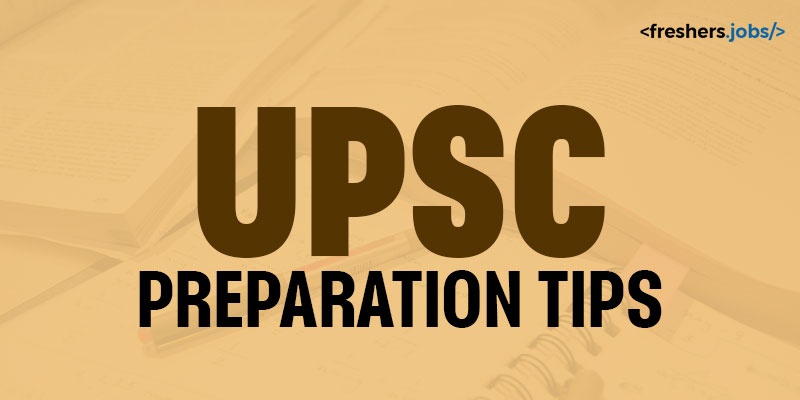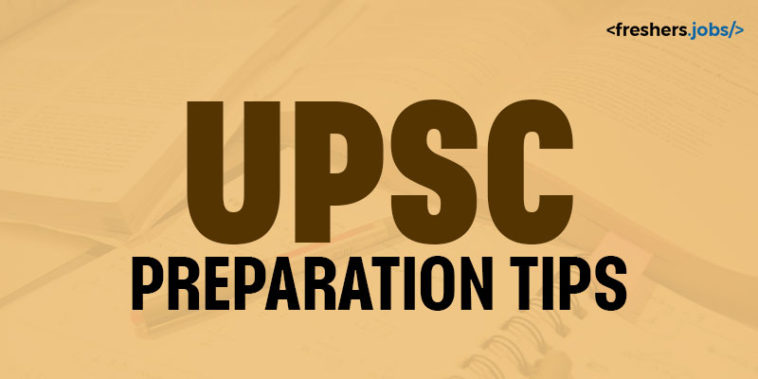Candidates for the UPSC are ready to begin studying for India’s most challenging exam. The candidates must be in a state of confusion and be under a great lot of pressure to start their preparation. So don’t worry, you’re insured by us with the best preparation tips.

The UPSC exam, one of the most prestigious in India, gets tens of thousands of applicants each year who are hoping to pass the series of exams and work for the government as civil servants. Tap to freshers jobs for UPSC preparation stratergy for beginners.
What is exactly needed for UPSC?
- You need a smart strategy and a precision focus if you want to succeed with flying colours.
- The competition will be beneficial, there is no question about that. Consequently, it is crucial to fully understand each concept.
- The majority of applicants believe that taking the UPSC exam without coaching is impossible. not anymore!
- You may master the subject on your own.
- You need solid strategy and preparation tips to guarantee your place on the list and beat out the competition.
Let us see how we crack the UPSC Exams with the right preparation and Planning. Here are the UPSC strategy for beginners tips. Down the page
Tip 1: Prepare yourself
- You should become ready for the journey before attempting to comprehend how to begin studying at home for the UPSC.
- Before you start studying, get yourself physically and emotionally ready for the exam.
- Set priorities and use time management skills.
- Depending on how well you know about the format of the UPSC exam, you should pace your IAS preparation strategy for beginners accordingly.
- The prelims, mains, and interviews are the three parts of the UPSC exam.
- Learn about the interview, mains, and preliminary exams.
- If you are working and have chosen not to resign, create a plan for how you will spend your time learning.
Tip 2: A structured Time Table
- It is impossible to emphasise the value of adhering to a structured timetable. Students frequently wonder how to make a schedule.
- A proper timetable includes your daily routine as well as your study plan.
- You can plan and prepare a timetable as per your Routine.
- Prepare time table so that you can get break time in between and spend time going for a walk, eating some fruits or doing something else.
- The example given above is intended to help you make a good schedule and emphasise how important it is to spend 8 to 10 hours per day studying.
- It is very important to have a daily task and timetable if you want to become proficient IAS, and IFS officers.
- Make a convenient timeline and stick to it before starting your preparation.
- If you make a schedule for your preparation, it will be easier and more effective.
- You would do better work and complete the course more rapidly.
- When examining the IAS subjects listed on the curriculum, take into account your strengths and areas you are weak.
Tip 3: Understand the Basic concept
- It’s essential to start practising nine to ten months before the pre-exam to have enough time to thoroughly read during the first few weeks in order to establish a foundation for yourself and construct ideas.
- Never move forward without first understanding the basics.
- If not, you’ll face countless issues in the future.
- The best UPSC tips is to give yourself enough time to grasp the principles, even if it takes some time.
- Else the hard work and efforts put in by you will be a squander.
Tip 4: To Make Notes
- Any candidate can gain from utilising a UPSC preparation strategy, and remembering the information they have learned much easier by writing it down or making notes as they are studying.
- Candidates can take notes, create a list of all the points in a notepad, or take down the important points in a notebook, all of which will help them remember everything during revision.
- Make sure you accurately and completely document the information so that you can understand it during the exam and avoid confusion.
Tip 4: Current Affairs
- Since the UPSC exam includes a significant portion of current affairs, it is essential to review them every day as the main UPSC preparation strategy for beginners.
- You should read the newspaper every day, and you may also learn about current events by visiting numerous websites and YouTube channels.
- Not just about what’s going on in our country, but also about important events happening around the world.
- Because we are aware that the UPSC is designed to assess a student’s in-depth knowledge, current affairs help us serve our country well.
Tip 5: Working on the Previous year’s Question Paper
- After finishing the entire course and your revision, you can go on to answer questions from previous years’ papers.
- They are useful for understanding question patterns and UPSC frequently includes surprising question patterns in the exam that you will learn about before sitting for the exam.
- Mock exams are crucial because they help students identify their strengths and weaknesses, offer them time to make corrections, and increase their chances of being chosen.
Tip 6: NCERT
- The NCERT textbooks for grades 6 through 12 are crucial for IAS exam preparation.
- You can get all the basics and the fundamentals from NCERT books.
- The information in these books is properly structured so that it is easy to prepare for the students.
- Furthermore, they are reliable because the government is the source.
- In previous years, UPSC’s questions have specifically referenced NCERT textbooks.
- So without a doubt, the finest books to use as a starting point for your IAS preparation are the NCERTs.
- Referring to books is a vital tip and can be considered as the top UPSC startegy for beginners.
- You should read a few extra advanced textbooks in addition to the NCERTs.
TIP 7: Revise Regularly
- Before beginning your UPSC preparation, each concept must be fully understood.
- The ability to master all topics also gives one a competitive advantage. Therefore, revision is crucial UPSC tips.
- Every seven days, make sure to review a subject you have studied.
- Revise what you have prepared for the day in the morning or in the evening.
- Weekends should only be utilised for the review of tough concepts.
- You should set aside at least two hours every day for revision which is the most essential IAS preparation strategy for beginners.
- After you’ve done taking chapter notes, revisions should be made the following day.
Tip 8: Exercise properly
- Exercise is a fantastic method to relax your body and relieve stress.
- Playing indoor and outdoor games, going on walks, swimming, and engaging in other activities could help the mind relax.
- This will help you feel more comfortable and confident when taking the UPSC exams and help you stay motivated, happy, and successful throughout your life.
- Yoga and meditation techniques can also be powerful stress relievers.
- You will get high concentration on what you prepare.
Tip 9: Mock Tests
- The candidates who will be attempting the UPSC Exams must keep this method of UPSC strategy for beginners in mind.
- The UPSC exam will last for three hours.
- This implies that there is a one-minute time limit for each question.
- Candidates must keep track of their time during this section.
- The questions must be answered by each candidate within the allocated time.
- The ideal strategy to maintain time management is to practise using timed question papers so that you can keep track of how much time is given for each question.
Tip 10: Motivate for Yourself
- This has a more significant impact than allowing other people to motivate you.
- Don’t be concerned about what people are going to say or do or what will happen next.
- Avoid comparing yourself to others and keep your focus on the issue at hand. Everyone has unique talents and limitations; you are one in a million.
- By getting through this, you will get stronger and develop into a better person, which will make your achievements even more beautiful.
Freshers, You can prepare as per the above-cited preparation tips and get various jobs alert that are released for IAS, IFS, IPS jobs and so on.
Interview Process in UPSC
- You won’t pass the UPSC exam just by being a bookworm.
- The UPSC board will interview the candidate during the personality test round, the last step in the exam procedure, to assess the applicant’s personality and eligibility for a career in the services.
- This calls for the holistic development of a person in addition to academic knowledge.
- Even in academics, the objective should be to continuously learn about the most recent national and international events and current affairs rather than merely completing the assigned subjects.
Conclusion
In the article, we have covered the UPSC preparation strategy for beginners. Doing something better than others can raise your chances of success even though nothing is guaranteed. I genuinely hope you found this article very educational and will make an effort to apply what you learned in your training. These UPSC government jobs preparation techniques can help you stand out from other applicants and feel confident about your selection. Never be afraid to tackle challenges in life. Keep your eyes on your objective and put all of your passion into achieving it.



